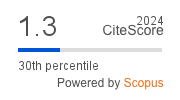Perceived parenting style and mother's behavior in maintaining dental health of children with Down syndrome
Downloads
Downloads
Galley, R. Medical management of the adult patient with Down syndrome. JAAPA 2005; 18(4): 45-6, 48, 51-2.
Mulia A, Kristi E. Fasilities of kids therapy Down syndrome in Surabaya. Jurnal eDIMENSI Arsitektur 2012; 1: 1-6.
Amaral Loureiro AC, Oliveira Costa F, Eustáquio da Costa J. The impact of periodontal disease on the quality of life of individuals with Down syndrome. Downs Syndr Res Pract 2007; 12(1): 50-4.
Shore S, Lightfoot T, Ansell P. Oral disease in children with Down syndrome: causes and prevention. Community Pract 2010; 83(2): 18-21.
Oredugba F. Oral health condition and treatment needs of a group of Nigerian individuals with Down syndrome. Down's syndrome. Research and Practice 2007; 12(1): 72-6.
Al Sarheed. Comparative study of oral health among trisomy 21 children living in Riyadh, Saudi Arabia: Part 2, gingival condition. The Saudi Dental Journal 2015; 27: 224–7.
Haliza T, Normastura AR, Azizah Y. Dental anomalies and oral hygiene status of Down syndrome children. International Journal of Public Health and Clinical Sciences 2015; 2(3): 33-41.
Al-Maweri S, Al-Sufyani G. Dental caries and treatment needs of Yemeni children with Down syndrome. Dent Res J (Isfahan) 2014; 11(6): 631–5.
Oliveira AC, Pordeus IA, Luz CL. Mothers' perceptions concerning oral health of children and adolescents with Down syndrome: a qualitative approach. European Journal of Paediatric Dentistry 2010; 11(1): 27-9.
Bracksley S, Dickson-Swift V, Anderson K, Gussy M. An exploration of mothers' perceptions about dental health. Journal of Theory and Practice of Dental Public Health 2013; 1(1): 9-14.
Lawson KL. Expectations of the parenting experience and
willingness to consider selective termination for Down syndrome. Journal of Reproductive and Infant Psychology 2006; 24(Issue 1): 43-59.
Choi H, Riper, MV. Maternal perceptions to open-ended questions about life with Down syndrome in Korea. The Qualitative Report 2016; 21(2): 288-98.
Pasquali L, Gouvea VV, Santos WS, Fonseca PN, Andrade JM, Lima TJS. Perceptions of parents questionnaire: evidence for a measure of parenting styles. Paidéia 2012; 22 (52): 155-64.
Mahoney FP. The relationship between parenting stress and maternal responsiveness among mothers of childreen with developmental problems. Dissertation. Mandel School of Applied Social Sciences. Case Western Reserve University. 2009.
Calik Var E, Kilic S, Kumandas H. Investigating opinions of mothers on different socioeconomic status in terms of perceived maternal styles. Eurasian Journal of Educational Research 2015; 61: 81-98.
Goleman D. Emotional intelligence (10th anniversary re-issue edn.). New York: Bantam Books; 2006.
Stewart SM, Bond MH, Kennard BD, Ho LN, Zaman RM. Does the Chinese construct of guan export to the West?. International Journal of Psychology 2002; 37(2): 74–82.
Smith LS, Ree M, Leonard H. Oral health and children with an intellectual disability: a focus group study of parent issues and perceptions. Journal of Disability and Oral Health 2010; 11(4): 171-7.
Chan KG, Lim KA, Ling HK. Care demands on mothers caring for a child with Down syndrome: Malaysian (Sarawak) mothers' perspectives. International Journal of Nursing Practice 2014; 1-10.
Chand S, Chand S, Dhanker K, Chaudhary A. Impact of mothers' oral hygiene knowledge and practice on oral hygiene status of their 12-year-old children: A cross-sectional study. Journal of Indian Association of Public Health Dentistry 2016; 12(4): 323-6.
Joosa E, Berthelsen D. Parenting a child with Down syndrome: a phenomenographic study. School of early childhood. Australia: Queensland University of Technology.Victoria Park Road; 2006. p. 49-54.
Arikunto S. Research procedure, a practical approach. Edition revision. Jakarta: Rineka Cipta; 2010.
Fonte BA. Relationship between parenting style, emotional intelligence and self esteem. 2009.
Lopes PN, Brackett MA, Nezlek JB, Schütz A, Sellin I, Salovey P. Emotional intelligence and social interaction. Personality and Social Psychology Bulletin 2004; 30(8): 1018-34.
Kobarg APR, Vieira V, Vieira ML. Validaçí£o da escala de lembranças sobre práticas parentais (EMBU). Avaliaçí£o Psicológica 2010; 9(1): 77-85.
Choi H, Riper, MV. Maternal perceptions to open-ended questions about life with Down syndrome in Korea. The Qualitative Report 2016; 21(2): 288-98.
Choi EK, Lee YJ, Yoo IY. Factors associated with emotional response of parents at the time of diagnosis of Down syndrome. Journal for Specialists in Pediatric Nursing 2011; 16(2): 113-20.
Phillip AB. A comparison of parenting dimensions between mothers of childreen with Down syndrome and mothers of typically developing children. Dissertation. Tuscaloosa: Department of Psychology in the Graduate School of the University of Alabama; 2016.
Lupton D, Schmied V. The right way of doing it all': First-time Australian mothers' decisions about paid employment. Women's Studies International Forum 2002; 25: 97–107.
Wong DL, Hockenberry M, Wilson D, Winkelstein ML, Schwartz P. Textbook of pediatric nursing. 6th ed. Jakarta: EGC; 2009.
Budiharto. Introduction health behavior and dental health education. Jakarta: EGC; 2010.
Doinita NE, Maria ND. Attachment and parenting style. ProcediaSocial and Behavioral Sciences 2015; 203: 199-204.
Akpabio A, Klausner CP, Inglehart MR. Mothers'/guardians' knowledge about promoting children's oral health. Journal of Dental Hygiene 2008; 82(1): 8-9.
- Every manuscript submitted to must observe the policy and terms set by the Dental Journal (Majalah Kedokteran Gigi).
- Publication rights to manuscript content published by the Dental Journal (Majalah Kedokteran Gigi) is owned by the journal with the consent and approval of the author(s) concerned.
- Full texts of electronically published manuscripts can be accessed free of charge and used according to the license shown below.
- The Dental Journal (Majalah Kedokteran Gigi) is licensed under a Creative Commons Attribution-ShareAlike 4.0 International License

















